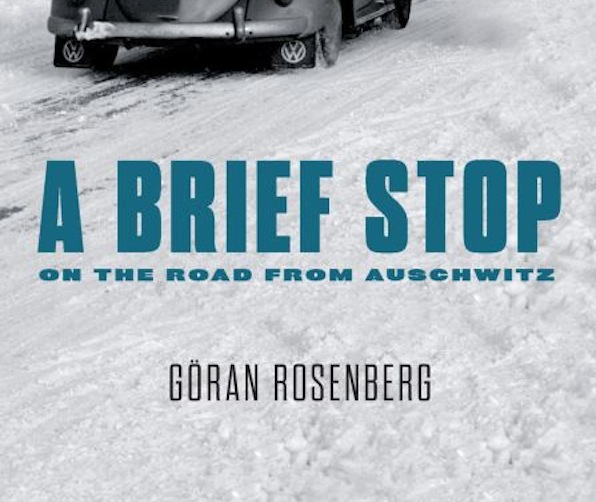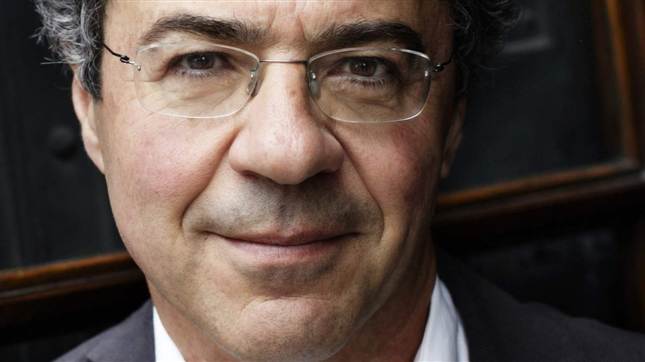Book Review: “A Brief Stop on the Road From Auschwitz” — Destined to Become a Classic
Göran Rosenberg has written a calm yet passionate account of events after Auschwitz, a memoir marked by great intelligence and equally great emotional intensity.
A Brief Stop on the Road From Auschwitz by Göran Rosenberg. Translated by Sarah Death. Edited by John Cullen. Other Press, 336 pages, $24.95.

By Roberta Silman
Sometimes, very rarely, you know when you are reading a book for review that it is destined to become a classic. It happens when you start to read more and more slowly because the words before you have an unforgettable urgency and immediacy. A Brief Stop on the Road From Auschwitz is such a book, and although I thought its title ungainly when it arrived, I realized when I closed it that its title was exactly right.
Already the winner of the prestigious August Prize after its publication in Swedish in 2012, Göran Rosenberg’s memoir is more than a specific second generation Holocaust account about Rosenberg’s Polish parents, David and Hala, after the Second World War; it is really a meditation on how civilized people struggle to continue after such an event as the Holocaust. Not only the people who went through what Rosenberg has called (in a video on YouTube) “the killing machine,” and their children and grandchildren, but us all.
For although many compare the Holocaust to other horrible historical events such as The Crusades, or The Inquisition, or the Armenian Massacre or the persecution of the American Indian or murders in Stalinist Russia or Mao’s China, Rosenberg makes a clear distinction between those catastrophes and the Holocaust. In the latter, for the first time in the history of the world, a human organization devised and executed a unique way to murder millions of people with hitherto unknown efficiency and brutality. Moreover, those who masterminded the project were helped along the way by millions of others who turned a blind eye to what was happening, not only during the war but for years afterward when those whose fate had made them “survivors” were struggling to find places for themselves in the world. A world that is still bombarded with what is known, sometimes dismissively, as “Holocaust literature.” But Rosenberg’s point is exactly that: We humans who consider ourselves civilized may have to struggle forever with stories about the Holocaust in an effort to overcome all that “the killing machine” wrought. And Holocaust literature is not something that exists in its own increasingly small pigeonhole, but speaks, when it is as good as this book, to everyone.
There are no generalities nor clichés in this memoir. Rosenberg follows his father on his unlikely journey from the Lódz ghetto to Auschwitz during the last months of the war. At the point the Nazis were trying to erase all evidence of their crimes, David Rosenberg rode on the trains that searched for places to dump the prisoners. He finally ended up in a small town in Sweden where he hoped to begin a new life. In the effort to chronicle his father’s trials and tribulations, Göran has done an enormous amount of research. The search was sparked by the letters his mother finally relinquished to him when he became an adult. As it moves from the present to the past, his narrative sometimes takes the form of a letter to his father. At other times the volume reads like a historical treatise with very specific statistics on policies that prevailed after the war; at other times it reads like Göran’s letter to himself. But behind all the facts is a narrator possessed of an amazing equanimity, and even a sly sense of humor, as he describes the almost comical chaos within German ranks as the war drew to a close. As Rosenberg puts it, although we humans love logic, Luck, chance, and freak are the stones with which every road from Auschwitz is paved. There are no other roads from Auschwitz but those of improbability.
Or how he tells us: By the end of 1946 there are still 250,000 Jewish survivors in European camps for displaced persons . . . The Bergen-Belsen camp remains in operation until 1950.
Or . . .it’s the labor hunger that decides where a new life can make its beginnings. These are the years when Sweden [neutral during the war] is transformed from a country convinced it can’t tolerate too many “aliens” to a country crying out for them. By 1948 a hundred thousand “aliens” have been granted Swedish residence permits, of whom “almost all are fully employed in the labor market.”
Finally, almost two-thirds through the book, on August 2, 1947 David writes to his childhood sweetheart who will become Goran’s mother, “My dearest Halinka, I got to Södertälje at seven in the evening.” You can feel your heart lift when you read those words, for soon David will have the support of a loving wife and his burly, street-smart older brother Natek, who was such a help to him when they were in Auschwitz. Before long David will make his way in this new country, finding employment as a pipe-fitter in a factory. He and Hala will marry, they will move from a small apartment to a larger one and be blessed with their children Göran and Lillian. By now Göran and the reader have come through various chapters entitled “The Place, The Wall, Carousel, The Stop.”
But, unfortunately, another story with a tragic ending has just begun. While Göran and Lillian experience a happy, peaceful childhood in an out-of-the-way Swedish town that happens to have a wonderful beach nearby, David’s horizon becomes increasingly narrow, almost totally over-shadowed by bad memories, insomnia, loss of self-esteem, anxiety, and fear. Like so many of the “survivors,” the ones who wrote books, like Primo Levi and Paul Celan and Jean Améry (formerly Hans Mayer), and many who didn’t, David Rosenberg cannot find a way to make peace with the future. Life in Sweden overwhelms him: the Swedes (who still get mixed reviews in Europe for their neutrality during the Second World War) revert to their natural xenophobia, Natek and his family emigrate to Israel, and David’s job becomes precarious after anti-Semitic remarks draw him into a fight that causes a concussion.
As the years go by his fellow Swedes (he and Hala got their Swedish citizenship) become less welcoming, the German government puts him through a Kafka-like mill when he tries to get reparations (this story is obscene in its details) and slowly his personality crumbles — he loses the will and energy to continue. And when someone who gives him a job that might lead to success dies unexpectedly in a car crash, he is shattered. Although David is under good psychiatric care in Sweden (one area where his adopted country did not stint its resources to help him), and although he experiences a short period of well-being after some electro-shock therapy, he dies at the end of July 1960 by his own hand when Göran is twelve.

Göran Rosenberg — there are no generalities nor clichés in this poignant memoir.
As Göran tries to parse his father’s untimely death, he takes the reader with him, into some of the books where he has tried to find answers,. He shares his conclusions. Some of these passages are the most moving in the book. With amazing compassion he examines the part that “The Place” plays in his father’s sad fate. Here he is trying to make sense of his self-destruction:
You just happen to get off at the wrong station on your road from Auschwitz . . .
It’s too small a place for someone like you, with too few people who appreciate where you come from and what you carry with you . . . It never becomes a home to you. Not the way it does to me.
Homelessness is an underrated hell for people like you, I think. Homelessness and the confusion of languages. The one has something to do with the other. To be at home is to be understood without having to say all that much.
But Göran Rosenberg understands that he has written this memoir not only to understand his father’s untimely death. He has done it because his father’s story has relevance to the world at large. In his last memoir, The Drowned and the Saved, Primo Levi contemplates “the shame of the world.” He goes on to write:
It has been memorably pronounced by John Donne and quoted innumerable times, pertinently or not, that “no man is an island,” and that every bell tolls for everyone. And yet there are those who, faced by the crime of others or their own, turn their backs so as not to see it and not feel touched by it.
That shame has also been examined by Czeslaw Milosz, a gentile compatriot of David Rosenberg’s who wrote one of the great poems of the 20th century, Campo dei Fiori, a stanza of which Rosenberg quotes in his chapter called “The Carousel.” In it the young Milosz, who is living in Warsaw, talks about not only the Campo dei Fiori, where Giordano Bruno was burnt while the Romans went on their merry way, but also about the carousel in Warsaw that was so close to the Ghetto that
At times wind from the burning
would drift dark kites along
and riders on the carousel
caught petals in midair.
In other stanzas Milosz explores how people refuse to acknowledge the tragedy playing out in their midst, a concept all too relevant to world events as I write this review. Milosz is also haunted by the loneliness of the dying and resolves that they can somehow be remembered, challenging us in the last stanza:
Those dying here, the lonely
forgotten by the world,
our tongue becomes for them
the language of an ancient planet.
Until when all is legend
and many years have passed,
on a new Campo dei Fiori
rage will kindle at a poet’s word.
Göran Rosenberg has answered that challenge splendidly. He has written a calm yet passionate account of events after Auschwitz, a memoir that should be read by anyone who ponders the infinite questions of good and evil, by educators frustrated by their attempts to reach their sometimes disaffected students, by world leaders who face insuperable odds, by Jews and Christians and Muslims and Buddhists and every other religion that exists. With A Brief Stop on the Road From Auschwitz, Rosenberg has not only given us a necessary book but, by confronting unspeakable sorrow with courage and reason, he has created a masterpiece marked by great intelligence and equally great emotional intensity.
Roberta Silman is the author of a story collection, Blood Relations, now available as an ebook, three novels, Boundaries, The Dream Dredger, and Beginning the World Again, and a children’s book, Somebody Else’s Child. A recipient of Guggenheim and National Endowment for the Arts Fellowships, she has published reviews in The New York Times and The Boston Globe, and writes regularly for Arts Fuse. She can be reached at rsilman@verizon.net.
Tagged: A Brief Stop on the Road From Auschwitz, Göran Rosenberg, Holocaust, memoir
